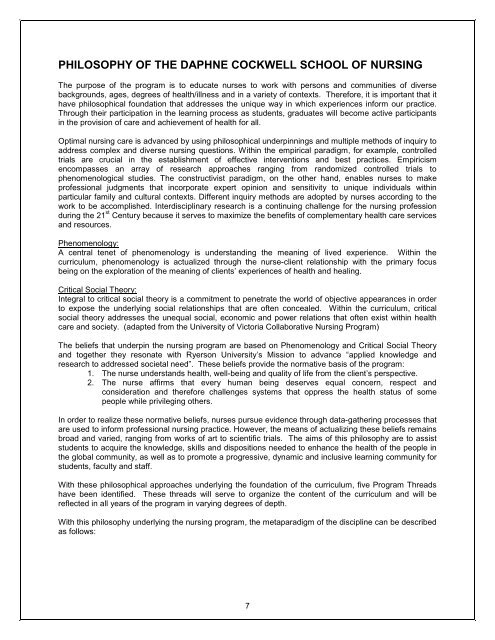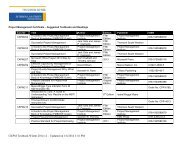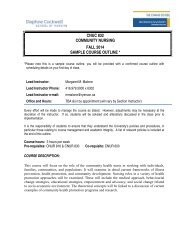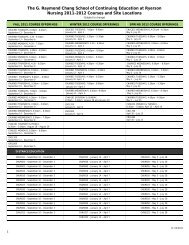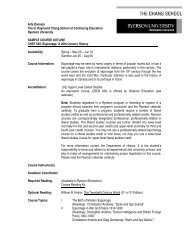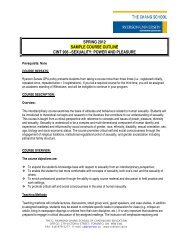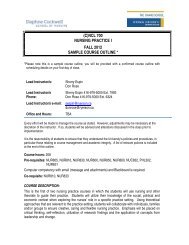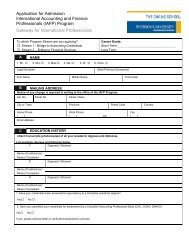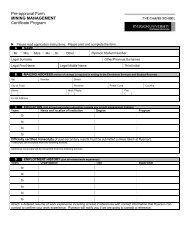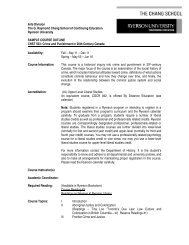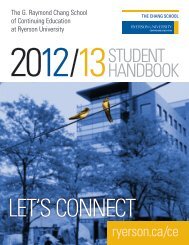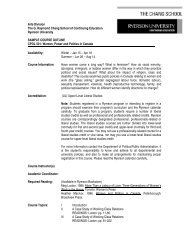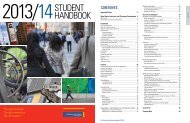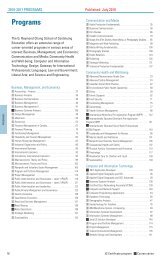School of Nursing - The Chang School - Ryerson University
School of Nursing - The Chang School - Ryerson University
School of Nursing - The Chang School - Ryerson University
Create successful ePaper yourself
Turn your PDF publications into a flip-book with our unique Google optimized e-Paper software.
PHILOSOPHY OF THE DAPHNE COCKWELL SCHOOL OF NURSING<br />
<strong>The</strong> purpose <strong>of</strong> the program is to educate nurses to work with persons and communities <strong>of</strong> diverse<br />
backgrounds, ages, degrees <strong>of</strong> health/illness and in a variety <strong>of</strong> contexts. <strong>The</strong>refore, it is important that it<br />
have philosophical foundation that addresses the unique way in which experiences inform our practice.<br />
Through their participation in the learning process as students, graduates will become active participants<br />
in the provision <strong>of</strong> care and achievement <strong>of</strong> health for all.<br />
Optimal nursing care is advanced by using philosophical underpinnings and multiple methods <strong>of</strong> inquiry to<br />
address complex and diverse nursing questions. Within the empirical paradigm, for example, controlled<br />
trials are crucial in the establishment <strong>of</strong> effective interventions and best practices. Empiricism<br />
encompasses an array <strong>of</strong> research approaches ranging from randomized controlled trials to<br />
phenomenological studies. <strong>The</strong> constructivist paradigm, on the other hand, enables nurses to make<br />
pr<strong>of</strong>essional judgments that incorporate expert opinion and sensitivity to unique individuals within<br />
particular family and cultural contexts. Different inquiry methods are adopted by nurses according to the<br />
work to be accomplished. Interdisciplinary research is a continuing challenge for the nursing pr<strong>of</strong>ession<br />
during the 21 st Century because it serves to maximize the benefits <strong>of</strong> complementary health care services<br />
and resources.<br />
Phenomenology:<br />
A central tenet <strong>of</strong> phenomenology is understanding the meaning <strong>of</strong> lived experience. Within the<br />
curriculum, phenomenology is actualized through the nurse-client relationship with the primary focus<br />
being on the exploration <strong>of</strong> the meaning <strong>of</strong> clients’ experiences <strong>of</strong> health and healing.<br />
Critical Social <strong>The</strong>ory:<br />
Integral to critical social theory is a commitment to penetrate the world <strong>of</strong> objective appearances in order<br />
to expose the underlying social relationships that are <strong>of</strong>ten concealed. Within the curriculum, critical<br />
social theory addresses the unequal social, economic and power relations that <strong>of</strong>ten exist within health<br />
care and society. (adapted from the <strong>University</strong> <strong>of</strong> Victoria Collaborative <strong>Nursing</strong> Program)<br />
<strong>The</strong> beliefs that underpin the nursing program are based on Phenomenology and Critical Social <strong>The</strong>ory<br />
and together they resonate with <strong>Ryerson</strong> <strong>University</strong>’s Mission to advance “applied knowledge and<br />
research to addressed societal need”. <strong>The</strong>se beliefs provide the normative basis <strong>of</strong> the program:<br />
1. <strong>The</strong> nurse understands health, well-being and quality <strong>of</strong> life from the client’s perspective.<br />
2. <strong>The</strong> nurse affirms that every human being deserves equal concern, respect and<br />
consideration and therefore challenges systems that oppress the health status <strong>of</strong> some<br />
people while privileging others.<br />
In order to realize these normative beliefs, nurses pursue evidence through data-gathering processes that<br />
are used to inform pr<strong>of</strong>essional nursing practice. However, the means <strong>of</strong> actualizing these beliefs remains<br />
broad and varied, ranging from works <strong>of</strong> art to scientific trials. <strong>The</strong> aims <strong>of</strong> this philosophy are to assist<br />
students to acquire the knowledge, skills and dispositions needed to enhance the health <strong>of</strong> the people in<br />
the global community, as well as to promote a progressive, dynamic and inclusive learning community for<br />
students, faculty and staff.<br />
With these philosophical approaches underlying the foundation <strong>of</strong> the curriculum, five Program Threads<br />
have been identified. <strong>The</strong>se threads will serve to organize the content <strong>of</strong> the curriculum and will be<br />
reflected in all years <strong>of</strong> the program in varying degrees <strong>of</strong> depth.<br />
With this philosophy underlying the nursing program, the metaparadigm <strong>of</strong> the discipline can be described<br />
as follows:<br />
7


